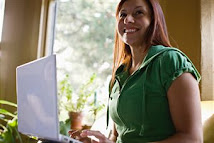 From time to time, I hear about refugee resettlement issues that are relevant to volunteers who are regularly in refugees' homes and familiar with aspects of the student's everyday life. This week, the topic is toilet training. I have been asked about this before, but since I do not have children, the process has always been somewhat of a mystery to me.
From time to time, I hear about refugee resettlement issues that are relevant to volunteers who are regularly in refugees' homes and familiar with aspects of the student's everyday life. This week, the topic is toilet training. I have been asked about this before, but since I do not have children, the process has always been somewhat of a mystery to me.Let this be one more opportunity for you to be a cultural broker. (The following conversation is between IOM Cultural Orientation personnel and resettlement workers in the U.S. )
Throughout the course of our work at the Refugee Housing Program at Mercy Housing, we have regularly heard complaints about young refugee children urinating on carpets, in common areas and other places other than in the bathroom. This is a problem that seems to transcend ethnicity and nationality. Regardless of its commonality, this can cause serious problems, including expensive cleaning charges and eviction for refugee families. Does anyone have any background information on various potty-training practices refugee families are bringing with them? Better yet, has anyone found any approaches that help to address this problem in a sensitive-but effective-way?
Thanks.
Leslie Olson
Refugee Housing Program
Mercy Housing
***
I can imagine a couple of dynamics here:
1. Some amount of urination on the floor can be part of the learning process -- figuring out the boundaries of what is acceptable and what is not; reveling in the control the child has over their bodily functions. In my experience as a parent, this can be more of an issue for boys than for girls, and for boys, "drawing" with urine can be a temptation. However, the parent's response to the action can be a factor in its recurrence. The parent has to also view urination on the floor as a problem -- if they do not, then the issue is educating the parent about the expense, smell, U.S. norms, potential for eviction, etc.
2. Refugee parents coming from places where it was normal to go to the bathroom outside, or to use the ground as the toilet, may not have experience potty-training a child in the way it is done in the U.S. They may be at a loss to know how to redirect the child's behavior, if the use of flush toilets is new to them as well. A positive parenting approach is to reward children for correct behavior (stickers, etc.) rather than punishing them. These methods will be unfamiliar to many refugees, and may be culturally uncomfortable for some. But it is worth offering them to refugees as a parenting tool. (A reward system assumes that a family has some kind of reward to give, but this may not always be the case, or may require some creativity around what to use as a reward -- if it is TV time, or junk food, this can raise other issues.) There is some discussion of discipline methods in our BRYCS illustrated parenting booklet (p. 11-14):
http://www.brycs.org/documents/RaisingChildren-Handbook.pdf
3. A refugee parent who is depressed or overwhelmed may not have the energy to respond to the action, which can also affect its recurrence.
Changing the behavior will require a consistent parental response. The parent may also need to discourage older siblings from laughing at the behavior, since laughter may encourage it (siblings also have an interest in not having a smelly home.)
4. Often, children just don't realize they have to go until it is almost too late. Putting a potty chair in a child's room, the place they are playing, or even outside, can help a child to avoid accidents, particularly if they are afraid of the flush of the toilet, or the bathroom seems too far away, or the toilet is too tall for them.
5. Again, as a parent, two other methods recommended to us were giving M & M's for using the potty (1 M&M for liquids, 2 M&M's for solids), or with a boy, putting a couple of Cheerios into the toilet and using them as target practice (apologies for the graphic descriptions!)
6. Involving the child in cleaning up the mess can be a deterrent.
Here are a few on-line potty training resources (I've not reviewed
them):
http://www.mayoclinic.com/health/potty-training/CC00060
http://www.keepkidshealthy.com/parenting_tips/potty_training/index.html
http://neenmachine.com/2007/06/04/10-steps-to-successful-potty-training/
Good luck,
Susan Schmidt, MSW
Bridging Refugee Youth and Children's Services (BRYCS) Consultant
***
Regarding potty training as practiced by Karen refugees from Burma, one of our Burmese/Karen CO trainers states that infants may wear cloth diapers; slightly older children, however, usually run around without any underpants or diapers. When nature calls, they "just go anywhere inside the house, and then the parents will clean up for them later." No big fuss is made about this.
While holding a child without a diaper or clothing on the bottom, people are careful about which direction they are pointing the child. When potty training does occur, the parent usually helps the child squat with their bottom over a crack in the bamboo floor (the house is made of bamboo and raised on stilts). The parent makes "a squeezing sound" as though defecating, and the child follows suit. Children are usually encouraged to attend to bathroom chores prior to bedtime so as to keep the bedding dry.
Another source told us that parents don't do potty training at all: it's left for the teachers when the children first go to school. Indeed, in the US, small accidents may happen, but it is to be remembered, they are small.
Best,
Peter Salnikowski
CO Programme Coordinator for SEA
IOM Mae Sot
***
Years ago we had a high rise public housing project in Springfield. The elevators didn't work and there were no toilets for kids playing outside. The result: they went in halls and stairwells because they didn't have time to get home.
However, my guess is that the problems with many of the refugees may be that they were living in situations where they had no diapers and in refugee camps there would have been no carpets to cause problems if little ones went where they were. Also, the cost of diapers may be a problem.
Would a community meeting asking "How did little ones manage where you came from?," and going on to explain about carpets, help? I am not sure how you convince people to pay for diapers!
Jean Caldwell
Springfield Somali Steering Committee










No comments:
Post a Comment